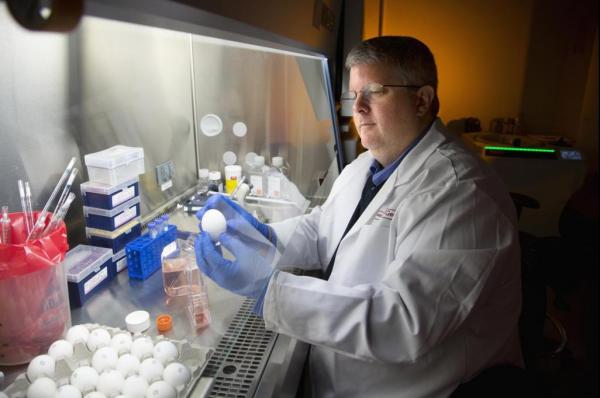
ATHENS, Ga., March 29 — Each year, researchers identify influenza strains expected to circulate during flu season and manufacture a vaccine aimed at them. Many years, strains not expected to pose a threat emerge, sickening people who have been vaccinated.
Scientists at the University of Georgia and Sanofi Pasteur developed a vaccine forH1N1 influenza that protects against pandemic and seasonal strains of the virus, they report in a study published in the Journal of Virology.
The study’s results raise potential for a flu vaccine that covers more than a few strains at a time, and is not affected by the careful guesswork currently used to determine the strains each year’s vaccine contains.
The vaccine was created using Computationally Optimized Broadly Reactive Antigen, or COBRA, to create synthetic compound vaccines based on genetic sequences from strains of influenza.
While the newly developed vaccine has only been tested with mice, success in the lab raises the possibility for a universal vaccine at some point in the future.
“We still have some work to do before we get a truly universal flu vaccine,” Ted Ross, director of the Center for Vaccines and Immunology at the University of Georgia, said in a press release. “But the COBRA vaccine we’ve developed for H1N1 virus subtypes is a major step in the right direction.”
The scientists developed nine candidate vaccines, all designed to recognize H1N1 viruses identified in the last 30 years, and several designed using sequences from the last 100 years. The nine candidates were given to mice either in cocktails or in prime-boost combinations, with those containing three specific candidate vaccines having the greatest effect on viral replication in the rodents.
While the rodent response to the vaccines was based on the efficacy of already-approved vaccines to leave little or no viral replication in the body, the scientists said the strategy for designing and using the vaccines could provide a model for designing much more broad, potentially multi-year protection for people.
Additionally, the scientists said the need to identify strains posing the greatest threat, and then stopping, tweaking and restarting production of the vaccine slows down its production. With a broadly-applicable vaccine, it could be produced continuously and more cheaply, while protecting more people from infection.
“What we have developed is a vaccine that protects against multiple different strains of H1N1 virus at once,” Ross said, “so we might be able to one day replace the current standard of care with this more broadly cross-protective vaccine.”
[Source:- UPI]




